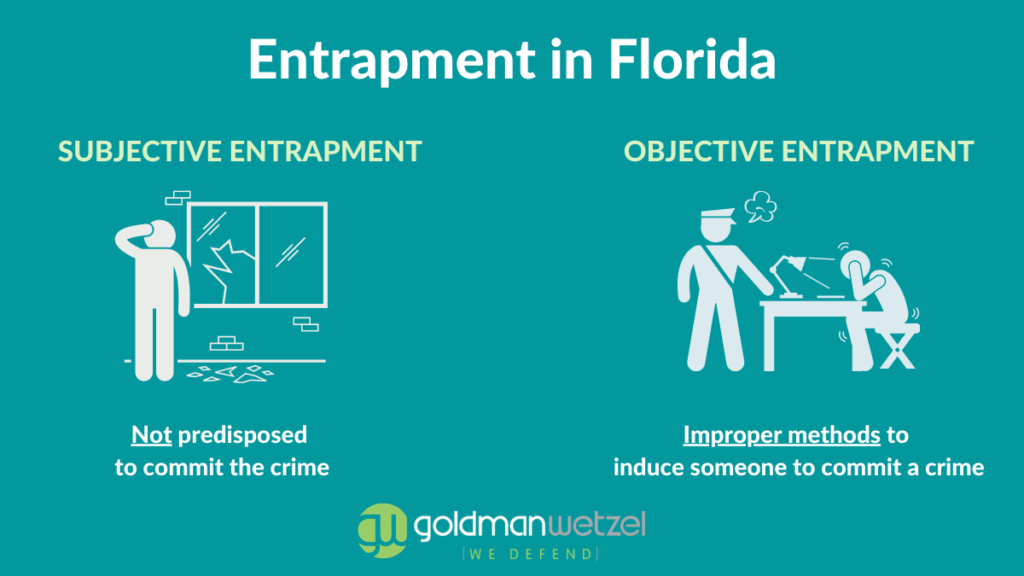In Florida, some criminal cases can use entrapment as a viable defense. Due to its legal characteristics, this strategy might not be suitable for all cases. For that reason, it is important to first understand what the definition of entrapment is.
Under Florida law, entrapment occurs when a law enforcement officer improperly coerces, persuades, or induces a person to commit a crime that she or he was not predisposed to do. In Florida, entrapment is illegal and if there is evidence of this act, the defendant might be absolved of all charges.
Entrapment is a concept that can be easily misunderstood. As a result, it is important to understand its definition and the law regarding entrapment. Below, you will find further information about the definition of entrapment in Florida as well as some possible defenses for these types of cases.
Florida Definition of Entrapment
Depending on the circumstances of the offense, a criminal lawyer can use entrapment as an affirmative defense for a wide range of criminal offenses such as drug crimes and sex crimes.
According to Florida Statute § 777.201(1), entrapment takes place when a law enforcement officer improperly induces or encourages a person to commit a crime that, under normal circumstances, he or she would have not committed.
Since in these cases the defendant was not predisposed to perform a criminal offense and was instead pursued or influenced to do it, the defense will need to present evidence to prove the entrapment and get an acquittal.
At this point, it is important to notice that entrapment does not apply to individuals that were ready or willing to commit a crime independently of the law enforcement’s encouragement.
Entrapment Elements in Florida
In order to prove entrapment, the defendant must be able to present preponderance of evidence. Some entrapment elements that could help build your defense might include:
- Law enforcement officers encourage the defendant to commit a crime in order to obtain evidence of the commission of a crime.
- Law enforcement officers used inducement or persuasion methods to convince the defendant to commit a crime, even though he or she was not predisposed to do so.
- The defendant’s actions were caused by the encouragement of a law enforcement officer. Examples of encouragement can be threats, harassment, fraud or flattery.
- The person that coerced the defendant was: a law enforcement officer, a person acting as an agent of law enforcement or cooperating with a law enforcement officer. Some examples of these people include but are not limited to police officers, prosecutors, informants and special agents.
Entrapment Defense in Florida
Entrapment laws in Florida provide two types of entrapment defenses:
- Subjective entrapment
- Objective entrapment
A subjective entrapment strategy defense is built on the defendant’s behavior. In other words, this defense is meant to prove that the person did not intend and was not predisposed to commit the offense. In order to prove this, the defense can gather evidence and witnesses that support that the accused was forced to commit a crime against his or her will.
On the other hand, an object entrapment defense focuses on the law enforcement’s behavior. This means that the defense needs to prove that law enforcement officers or people acting as law enforcement officers used egregious methods or tactics to induce a person to commit a crime.

Building an appropriate legal strategy will mostly depend on the circumstances of each case. For further information, you should enlist the help of a criminal attorney. Call us today to schedule a free consultation.
Examples of Entrapment
Entrapment is not the same as opportunity. In other words, law enforcement officers can present a person with the opportunity to commit a crime. However, the courts expect people to resist normal temptations to engage in criminal activity.
Below there are some examples that can help you understand this concept better:
- Example 1: an undercover officer poses as a prostitute. This is not entrapment since there is no coercion, threats, promises, or trickery. It is just an opportunity that law-abiding citizens would turn down. However, it is entrapment if the agent tells you that her procurer will injure you if you do not hire her for the night.
- Example 2: an agent who wears down and eventually convinces someone with a legal prescription for Xanax to sell the drugs to him by saying he needs the pills because he is gravely ill. The agent’s constant insistence to purchase the drugs might be presented as entrapment.
Law enforcement officers are allowed to create the opportunity for people to commit a crime, but they are not allowed to use influence or methods of persuasion to coerce a person to commit an illegal act.
Contact a Florida Criminal Defense Attorney
Being accused of criminal charges can have severe effects on your life. If you are facing charges, entrapment might be a viable defense for your case. Get in touch with us to learn more about your legal options.
Goldman Wetzel provides legal representation to individuals facing criminal charges in Pinellas County, St. Petersburg, Bradenton, Tampa, Sarasota, Clearwater, and surrounding areas.
If you’re looking for legal representation, contact us through our email form or call us at 727-828-3900 to book a free no-obligation consultation.

